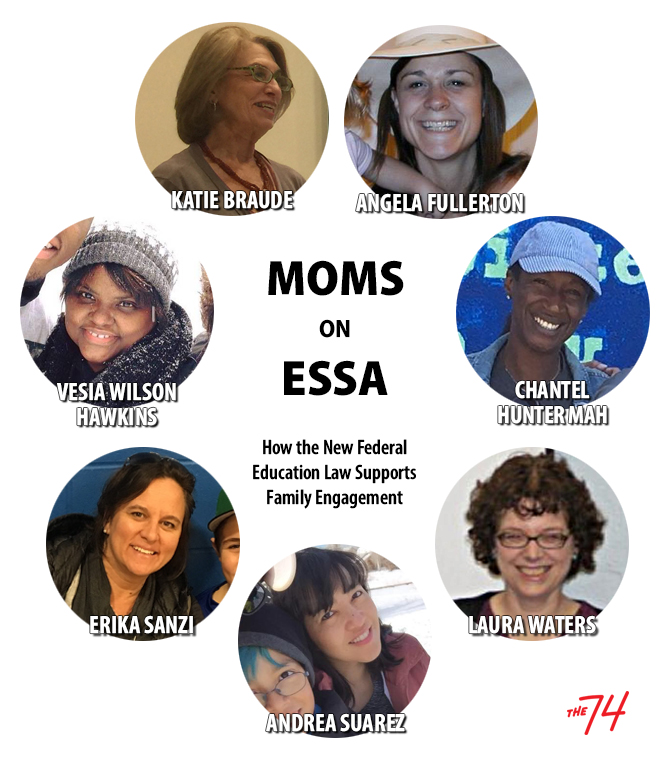Parents Are Tired of Being Asked for Input That’s Just for Show — School Districts Must Give Them Real Power to Make Change in the Classroom

This piece is part of a series on engaging parents and families under the Every Student Succeeds Act, examining from parents’ perspectives how districts and schools can best use new funding to make parents partners in improving education in their communities, and how to measure whether those efforts are working. Click through the grid below to read essays from parents across the country.
The Every Student Succeeds Act requires school districts to set aside at least 1 percent of their Title I funding for parent engagement. Yet the parent engagement policies we’ve seen rarely reach their potential to improve student success.
In the Los Angeles Unified School District, district funds are often spent on programs that teach parents how to support their kids’ education at home, to encourage volunteering and respond to parent concerns through parent centers and parent representatives at school sites.
While educating parents and soliciting their feedback on school-site issues is important, authentic parent engagement goes further. Parents need access to the knowledge and tools to engage in policymaking at the district and school board levels, where real power to make positive change resides. We at Speak UP, a Los Angeles–based grassroots organization of parents who want a more powerful voice in education policy, believe that the district should play a role in those efforts.
Parents are generally kept in the dark about how the most important decisions affecting their children’s education are made. In LAUSD, some of the farthest-reaching policies stem from the collective bargaining agreement between the teachers union (United Teachers Los Angeles) and the school district. These include not only salaries and benefits but also how teachers are assigned to schools and classrooms, the frequency and parameters for their performance evaluations, the criteria for layoffs and dismissals, and parent participation in school leadership councils.
Most parents don’t know that tenure doesn’t refer to “10 years” and are shocked that it takes only 18 months to achieve lifetime job protections in their schools. They are unaware that seniority, rather than performance, determines where teachers teach, how much they make, and whether they are laid off first. They do not know that the contract actually limits their decision-making power on school leadership councils by mandating that teachers make up the majority voting bloc.
(Click through the grid below to read other parent perspectives)

State and district funds can support meaningful parent engagement by allocating funds to shine a light on what the teachers’ contract actually contains, and how it relates to the things that have a daily impact on our kids, as well as parents’ roles in school-site decisions. The district can do this by holding regular briefings and feedback sessions at parent centers, training parent leaders to share the information with parents at their school sites, and establishing a feedback process for parents to give their input on the contract proposals.
Beyond providing transparent information to parents and soliciting their feedback, however, districts need to give parents real and actual power to make change. Parents are tired of the kind of “engagement” that asks for their input and then promptly ignores it.
One potential way to hold districts accountable for listening to parents on these issues is to give parents a vote to approve or deny the union contracts, and make school board support contingent upon parent approval. To our knowledge, no one has ever tried this before.
For years, the district has operated behind closed doors, largely shutting parents out of the negotiation process. The final collective bargaining agreement has as much impact on kids as it does on the adults who negotiate its terms. But kids don’t have a union. Kids have parents, and parents are the only advocates with no financial interest motivating their actions. Their sole interest is in the success of their kids, which is, after all, the very purpose of education. Parents have a right to an equal role in the collective bargaining process to ensure that the result puts kids rather than adults first.
There’s one other way parents can hold the school board accountable for including them and listening to their needs: Get out and vote. Parents did that in last May’s LAUSD school board election, organizing against and unseating the two-term incumbent in District 4 by a landslide. That should serve as a wake-up call to anyone who thinks parents can safely be ignored.
However, a significant percentage of parents in Los Angeles are unable to vote for school board members because of their status as undocumented immigrants. We believe these parents have just as much of a right to have their voices heard when it comes to their kids’ education. Any vote to approve or deny union contracts should include all public school parents, including undocumented immigrants.
This would give real power to the most disenfranchised parents, whose kids are often stuck in the lowest-performing schools. LAUSD recently declared itself a safe zone for undocumented immigrants, but families should expect more than just safety. They should expect educational excellence and the power to make it happen.
There is an absolute link between parent involvement and student achievement, and it’s our responsibility to find a way to make sure parents are a piece of the puzzle of their children’s academic success. We can think of no better use of federal parent engagement funds than to ensure that parents have full information about, and an equal say in determining, the policies that have the greatest impact on their kids’ education.
Parents have been shut out of the process long enough. It’s time to shift the paradigm from parent engagement to parent power. It is the only way to hold the school district accountable for putting kids first.
Katie Braude is executive director of Speak UP, a Los Angeles–based grassroots organization of parents who want a more powerful voice in education policy.
Chantel Hunter Mah is a family-law and estate-planning attorney from South Los Angeles. Her children currently attend Mark Twain Middle School and Venice High School. She is a member of Speak UP and the Venice Chamber of Commerce’s Education Committee and was formerly employed by LAUSD as a parent/community representative. Additionally, she has served in a variety of school leadership roles, including School Site Council, Local School Leadership Council, and booster club president.
Get stories like these delivered straight to your inbox. Sign up for The 74 Newsletter

;)